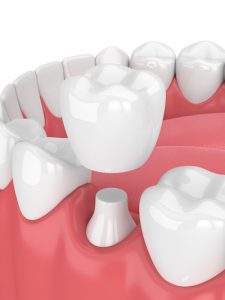If you have a few problems with your teeth, contact the dentists in El Paso, TX who can utilize tools, training, and technology to treat almost any problem. We provide safe and successful treatments such as dental crowns to ensure that you can smile big again in no time. Continue reading to learn more about our crowns, and then call us at (915) 621-2880 to book your consultation appointment with East El Paso Dentist for restorative dentistry solutions.

Why Are Dental Crowns Used?
Dental crowns are a type of tooth restoration that may be utilized to repair severely worn, weak teeth, misshapen, or uneven teeth. However, the crowns might also be used to support a dental bridge or conceal dental implantation work.
The crowns may also be beneficial for youngsters who are susceptible to decay. A tooth crown dentist in your region can use stainless steel crowns on primary teeth to preserve them from decay and cavities.
Can I get a dental filling instead?
Dental crowns are only one of the many choices available; you may, for example, select a dental filling instead. Fillings can sometimes be used to replace crowns, depending on the amount of filling required. When a filling makes up 50% or more of a tooth, crowns become unavoidable. Because fillings do not guarantee that you will never require a crown again, they are not as reliable as predicted.
Can I get dental veneers instead?
Porcelain dental veneers or dental bondings might be adequate to safeguard teeth with minor cracks or discoloration from more serious damage. Veneers and dental bondings can be used to repair a tooth’s incorrect form when it has minor chips or staining. Teeth with shallow damage that require inlays or onlays could also be treated by these options. If you’re thinking about either of them, see a cosmetic dentist immediately.
3 main reasons for dental crown treatment:
A Broken Tooth
The most reliable predictor of whether or not a tooth will fracture in the future is if it has already fractured previously. Count yourself fortunate if your tooth has shattered and your dentist advises you to get a crown! When a tooth fractures, it’s frequently deep enough that the break necessitates a root canal before the crown can be placed, or it may break below the point where bone would allow for restoration.
After the tooth is removed, a more expensive replacement may be recommended, such as an implant or bridge. That crown is starting to sound appealing, doesn’t it? A dentist will frequently propose crowns for teeth that they perceive are at risk of fractures, such as teeth with exceedingly large fillings or teeth with visible fracture lines (particularly if the patient has a history of grinding or clenching).
A Large Filling
When you have a cavity in your tooth, more tooth structure has to be removed in order to fill it. As a result, if you have a tooth that has been filled numerous times throughout the years, there is frequently little ground left on which we may work with. The composite (or “white filling”) that we employ must be connected to the tooth by means of an adhesive.
Even a small amount of natural tooth surface area can make a big difference: if there is little or no natural tooth surface area left, the bond will be weak, and the filling will fall out. Also, because composite materials are not as robust as crown metals (gold or porcelain) used in fillings, the chances of the filling or tooth breaking are much higher with very large fillings.
Severe Tooth Decay
The only way to treat tooth decay is to drill it out before it spreads, but what happens when the cavity has gotten too big? When the size of a cavity reaches a certain point, your dentist won’t be able to remove the decaying tooth material without jeopardizing the structural integrity of your tooth. Fortunately, a dental crown covers the entire visible surface of your tooth above the gum line, restoring its natural strength after the decaying section has been removed.
Dental Crown With a Dental Implant
If you’re having trouble eating certain foods because of missing or damaged teeth, it’s time to take some sort of action. A dental implant may be used to restore a missing tooth or even to hold dentures in place. Implants are one of the most successful restorations due to their resemblance to natural roots and their near-identical strength. Dental crowns may be used to replicate the appearance of natural teeth, allowing them to be restored.
How Long Do Dental Crowns Last?
We now have the ability to make sturdy crowns that can endure for years, if not decades, in today’s world of dentistry. We like to reassure our patients that our crowns are almost indestructible. A crown may break as a consequence of poor oral health, violent trauma, or any number of factors. That said, we can replace the faulty crown with another crown as long as there is enough healthy tooth beneath it.
Schedule a Dental Crown Consultation Today!
Dental crowns are usually the only viable option for restoring fractured teeth and filled teeth with large cavities. If you are experiencing decayed, fractured, or missing teeth call us today! You can reach us at (915) 621-2880 or click on the Appointments tab above!
